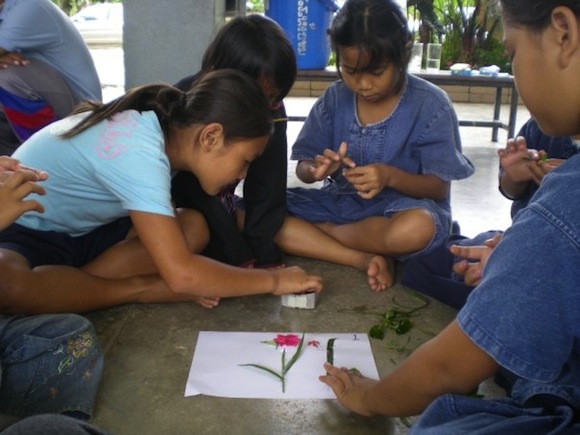Why You Don’t Need To Know The Local Language To Teach English Abroad
 As someone who spent a summer in Thailand teaching English to students from preschool level through college, people often assume that I can speak fluent Thai. While I was able to pick up some conversational phrases from being immersed in the culture, I was nowhere near fluent. Then comes the question I always know is coming.
“How can you teach English if you don’t speak the local language?”
As someone who spent a summer in Thailand teaching English to students from preschool level through college, people often assume that I can speak fluent Thai. While I was able to pick up some conversational phrases from being immersed in the culture, I was nowhere near fluent. Then comes the question I always know is coming.
“How can you teach English if you don’t speak the local language?”
You’re Not A Crutch
Before arriving at my placement in Thailand, I had the exact same thought running through my mind as well. It made me nervous to think that I might be useless in my teaching efforts when I wanted to badly to make a difference. However, I was told over and over by the program coordinators that I would have no problem getting through to my students. [pullquote]…the students will benefit from being fully immersed in an environment where all the English language is spoken, as that is what they are there to learn. It is what makes having a native English speaker a valuable asset to have in their local schools.[/pullquote] The basic philosophy behind this way of thinking is the students will benefit from being fully immersed in an environment where all the English language is spoken, as that is what they are there to learn. It is what makes having a native English speaker a valuable asset to have in their local schools. And, honestly, I can say first-hand that it works. Because I was not able to give the students a “crutch” to lean on by letting them brush through the English lessons by interjecting Thai, they were forced to use only English.Come Prepared
One thing that is extremely important when teaching English as a second language is to prepare the lessons beforehand. You must familiarize yourself with what these students already know so you can make sure not to go too slow or too fast in your teaching. You do not want to bore students, but you also do not want to frustrate them to the point where they feel hopeless. The group of volunteers I taught with kept a very detailed log for each school and class telling what they taught, what activities they did, what worked, what did not work and possible lesson ideas for the next group to implement. [pullquote]Make sure you know what level the students are up to, as well as what format their testing is in. If they are given written exams, teaching them only using oral techniques would be not very beneficial.[/pullquote]What’s The Age/Level Of The Students?
It also helps to think about the age group and level you are teaching. For the preschool children, I always found starting the day with the alphabet and then doing activities so they could learn letters and corresponding words was a good idea. For example, coloring the letter “A” and then having them draw an apple to correspond. Obviously, an activity like this would not work for older students. With the college classes, we often taught using role-playing and using conversational techniques, so they would know how to properly speak when looking for a job or during a meeting. Make sure you know what level the students are up to, as well as what format their testing is in. If they are given written exams, teaching them only using oral techniques would be not very beneficial.Visual Aids Rock
Visual aids were always extremely helpful, as well, especially with the language barrier. It is always advantageous to show students a picture of something and then have them pronounce what it is and do an activity based upon it. Just keep in mind cultural differences may exist that you are not aware of. For instance, when teaching a class of elementary level children, we decided to play a game of charades to learn about animals. What we did not realize was while we may say “moo” to indicate a cow, children in Thai culture use completely different sounds to depict the animals. Obviously we can not say that they are wrong, because it is simply a cultural difference. Learn what these are, and your teaching experience will be a lot easier.Use Resources
Lastly, take advantage of websites that other teachers use to share ideas and experiences. One website that became my teaching bible was this one: http://www.csun.edu/~hcedu013/eslplans.html There are a lot of great tips on how to create effective lesson plans. And always remember, you know the material you are teaching. As a native English speaker you know the rules of grammar, usage, and pronunciation. Be confident in your abilities and you will have a very rewarding experience teaching English as a second language.
Hi, I’m Jessie on a journey!
I'm a conscious solo traveler on a mission to take you beyond the guidebook to inspire you to live your best life through travel. Come join me!

Want to live your best life through travel?
Subscribe for FREE access to my library of fun blogging worksheets and learn how to get paid to travel more!



What program did you go through to Teach Abroad in Thailand? I am currently considering teaching abroad in Thailand, and interested in knowing which programs past participants have used.
@Sarah M- I did it as a volunteer abroad experience. If you don’t mind paying a small fee to live with a family, have them cook for you and have in-country support I highly recommend International Volunteer Headquarters. They’re all about keeping everything local and you’ll be immersed in the local culture (ie no 5-star hotels or highly acclaimed chefs ha). If you need any other info feel free to email me at [email protected].